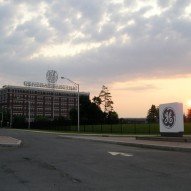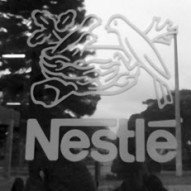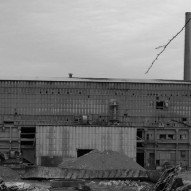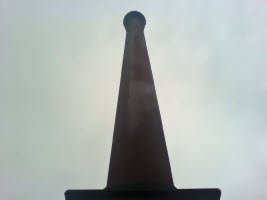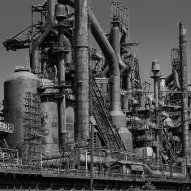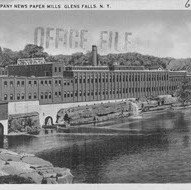Types of Companies with Asbestos Exposure
Aerospace
Table of Contents
- 1 Aerospace
- 2 Automotive Factories
- 3 Chemical Plants
- 4 Construction Sites Other Jobsites
- 5 Electronics Fabrication Plants
- 6 Food Processing Plants
- 7 Glass Plants
- 8 Manufacturing Plants
- 8.1 Manufacturing Plants in New York State With Asbestos Exposures
- 8.2 Albany Felt Company
- 8.3 ALCO
- 8.4 American Standard
- 8.5 Armstrong World Industries
- 8.6 Auburn Plastics
- 8.7 Bausch & Lomb
- 8.8 Blue Circle Cement
- 8.9 Carborundum Company
- 8.10 Carrier Corporation
- 8.11 Chicago Pneumatic
- 8.12 Dresser-Rand
- 8.13 Dunkirk Radiator Corporation
- 8.14 DuPont
- 8.15 Foster Wheeler
- 8.16 Ingersoll Rand
- 8.17 Owens Corning Delmar Plant
- 9 Metal Smelting Plants
- 10 Paper Companies
- 11 Pharmaceutical Plants
- 12 Power Plants
- 13 Shipyards
- 14 Textile Mills

The advent of the aerospace industry created jobs during the twentieth century. Responsible for the design and production of aircraft, missiles, rockets, and spacecraft, over a million Americans were employed by aerospace companies at the industry’s height during the 1980s.
Unfortunately for these workers, aerospace factories typically used asbestos materials and equipment prior to the 1990s.
This included brakes, hoses, engines, and insulation material for planes. The planes had asbestos-containing pumps, valves, boilers, and other equipment.
The companies that sold these asbestos products to aerospace factories knew that asbestos posed serious health risks to factory workers.
Despite this, the asbestos companies did not warn workers of these dangers.
Many retired workers from the aerospace industry have developed mesothelioma, an aggressive cancer that most often forms on the lining of the lungs.
Automotive Factories
 For over a century, the automotive industry has been a vital source of employment for the American workforce.
For over a century, the automotive industry has been a vital source of employment for the American workforce.
Although the industry is most closely associated with Detroit, Michigan, automotive assembly plants existed in many other states. Prior to the 1990s, these factories used a great deal of asbestos equipment and materials.
Auto plants had asbestos-containing pumps, valves, turbines, boilers, and other equipment. Automobile brakes, gaskets, and clutches also had asbestos.
Chevrolet
Plant closed 2007
Buffalo, NY
Chemical Plants
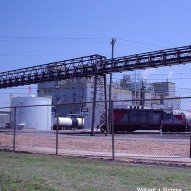 Chemical manufacturing in the United States employs over a million Americans. Responsible for such diverse products as plastics, pharmaceuticals, ceramics, and flavorings, chemical production is a major American industry.
Chemical manufacturing in the United States employs over a million Americans. Responsible for such diverse products as plastics, pharmaceuticals, ceramics, and flavorings, chemical production is a major American industry.
Although people have been producing and refining chemicals for thousands of years, the industry’s modern form emerged around the turn of the 20thcentury, spurred by a number of innovations made in the production of chemical dyes, plant fertilizers, sulfuric acid, and caustic soda.
Large factories were erected to manufacture these and other chemicals in bulk, and many American workers were hired to fulfill the labor needs of the industry.
Prior to the 1990s, chemical factories and plants used equipment and materials made from asbestos in a variety of applications. Asbestos-containing equipment included pumps, valves, turbines, boilers, and other equipment. Chemical factories also used asbestos lab and filtering equipment. Plastic factories used asbestos molding compounds.
Dupont
2551 Buffalo Ave
Niagara Falls, NY 14303
Hercules / Ciba Geigy
89 Lower Warren Street and Quaker Road
Glens Falls, NY 12801
Schenectady Chemical
1302 Congress Street
Schenectady, NY
Construction Sites Other Jobsites
 Nearly six million American workers are employed by the construction industry – one of the industries involved with the Asbestos issue. During the bulk of the 20th century, asbestos could often be found in construction equipment, as well as materials such as gaskets, ceiling and floor tile, joint compound, caulking, and shingles.
Nearly six million American workers are employed by the construction industry – one of the industries involved with the Asbestos issue. During the bulk of the 20th century, asbestos could often be found in construction equipment, as well as materials such as gaskets, ceiling and floor tile, joint compound, caulking, and shingles.
Asbestos, a fibrous mineral that was commonly used as a construction and building material prior to the 1990s, is the sole known cause of mesothelioma – an aggressive cancer most often forming in the lining of the lungs.
During construction projects, asbestos materials needed to be cut, ground, installed, and occasionally demolished. Any of these actions would release and agitate a great deal of asbestos dust, contaminating the air at the site with millions of harmful asbestos fibers. These asbestos materials would also wear down over time, due to natural degradation, repair, and maintenance, producing even more asbestos dust.
The millions of construction workers who inhaled these fibers are at a high risk of developing mesothelioma.
Construction workers were never told of these dangers by the asbestos industry. The asbestos industry had been aware of the health hazards of asbestos since the 1920s, but did not warn workers. Because of this, and because mesothelioma is only known to be caused by asbestos, construction workers who develop mesothelioma have the right to seek compensation for their illness.
It is important, however, to seek out experienced mesothelioma attorneys when pursuing an asbestos lawsuit.
Electronics Fabrication Plants
Many Americans have been employed at electronics plants that build circuit boards, radios, televisions, and computer equipment. These sites put workers at a high risk of developing mesothelioma due to the asbestos equipment that was used extensively at these production facilities, including pumps, valves, insulation, boilers, and turbines.
General Electric Plants
1 River Road
Schenectady, NY 12345
GTE Sylvania
50 Johnston St.
Seneca Falls, NY
Xerox
800 Phillips Road
Webster, NY 14580
Food Processing Plants
 The world has dramatically increased its reliance on processed foods over the past century. A significant portion of the American diet relies on food that has been produced or packaged in large factories and processing plants.
The world has dramatically increased its reliance on processed foods over the past century. A significant portion of the American diet relies on food that has been produced or packaged in large factories and processing plants.
Prior to the 1990s, these food processing plants and factories used asbestos materials and equipment such as insulation, valves, pumps, packing, gaskets, and ovens.
The businesses that sold asbestos materials and equipment to food processing plants did not warn food processing workers that asbestos was hazardous. Since the 1920s, these companies were aware that asbestos could cause mesothelioma – a deadly cancer of the lining of the lungs.
However, they actively suppressed this information, choosing profits over the lives of workers. As a result, thousands of former food processing workers still die from mesothelioma every year, and millions more are at risk.
Nestle
555 Fay Street
Fulton, NY 13069
Glass Plants
 The glass manufacturing industry employed hundreds of thousands of Americans during the 20th century. Prior to the 1990s, glass workers were exposed to asbestos equipment, including insulated tanks, tongs, pumps, valves, and boilers.
The glass manufacturing industry employed hundreds of thousands of Americans during the 20th century. Prior to the 1990s, glass workers were exposed to asbestos equipment, including insulated tanks, tongs, pumps, valves, and boilers.
Corning Glass Works
1 West Market Street
Corning, NY 14831
Manufacturing Plants
 The manufacturing industry was the primary driver of the American economy throughout much of the 20th century. Millions of people have been employed by the American manufacturing sector.
The manufacturing industry was the primary driver of the American economy throughout much of the 20th century. Millions of people have been employed by the American manufacturing sector.
Prior to the 1990s however, most U.S. factories utilized asbestos materials and equipment throughout the facilities in equipment and production.
Manufacturing Plants in New York State With Asbestos Exposures
- Alcan (Oswego)
- Alcoa (Massena)
- Beech Nut (Montgomery)
- Bethlehem Steel (Buffalo) (Lackawanna)
- Blue Circle Cement (Ravena)
- Borg Warner (Ithaca)
- Bristol-Meyers (East Syracuse)
- Ciba Geigy-Hercules (Queensbury)
- Corning Glass Works
- Eastman Kodak (Rochester)
- Fairchild Republic (Farmingdale)
- Foster Wheeler (Dansville)
- Garlock (Palmyra)
- General Electric (Auburn, Waterford, Schenectady, Hornell, Hudson Falls, Fort Edward)
- General Motors Powertrain (Massena)
- Goulds Pumps (Seneca Falls)
- IBM (Poughkeepsie, Endicott, Hopewell Junction, Owego, Kingston, Yorktown)
- International Paper (Ticonderoga)
- International Paper (Corinth)
- International Wire (Camden)
- Kraft Foods (North Lawrence)
- Lockheed Martin (Owego)
- Nabisco (Buffalo)
- Nestle Foods (Fulton)
- Northrop Grumman (Bethpage)
- Occidental Chemical (Niagra Falls)
- Revere Cooper (Rome)
- Revere Smelting (Middletown)
- Reynolds Metals (now Alcoa) (Massena)
- Stauffer Chemical (Skianeateles Falls)
- Union Fork & Hoe (Utica)
- Wabash Alloys (Syracuse)
- Wyeth-Ayerst (Pearl River)
- Xerox (Rochester)
Albany Felt Company
Albany, NY
ALCO
Schenectady, NY
American Standard
40 West 40th Street
Manhattan
New York, NY 10018
Armstrong World Industries
Fulton, NY
Auburn Plastics
Auburn, NY
Bausch & Lomb
Blue Circle Cement
Ravena, NY
Carborundum Company
Carrier Corporation
6304 Thompson Road
Syracuse, NY
Chicago Pneumatic
Utica, NY
Dresser-Rand
Painted Post, NY 14870
Dunkirk Radiator Corporation
2201 Dwyer Ave.
Utica, NY 13501
DuPont
2551 Buffalo Ave
Niagara Falls, NY 14303
Foster Wheeler
9431 Foster Wheeler Road
Dansville, NY 14437
Ingersoll Rand
199 N Main St
Athens, PA 18810
Owens Corning Delmar Plant
1277 Feura Bush Rd
Feura Bush, NY 12067
Metal Smelting Plants
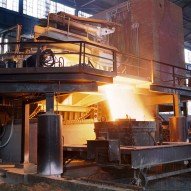 Metal manufacturing in America has roots extending all the way back to the colonial era, and has been a major U.S. industry ever since. Smelting plants working with steel, iron, copper, and aluminum have been major sources of employment for American workers, especially during the bulk of the twentieth century.
Metal manufacturing in America has roots extending all the way back to the colonial era, and has been a major U.S. industry ever since. Smelting plants working with steel, iron, copper, and aluminum have been major sources of employment for American workers, especially during the bulk of the twentieth century.
Prior to the 1990s however, these smelting plants exposed metal industry workers to the deadly carcinogen asbestos. As a result, many former metal workers have been diagnosed with the highly aggressive cancer mesothelioma.
Alcan
448 Country Route 1A
Oswego, NY
ALCOA
Park Avenue East
Massena, NY 13662
Bethlehem Steel
Crucible Steel
Syracuse, NY
Revere Copper
1 Revere Park
Rome, NY 13440
Reynolds Metal
194 Country Route 45
Massena, NY 13662
Paper Companies
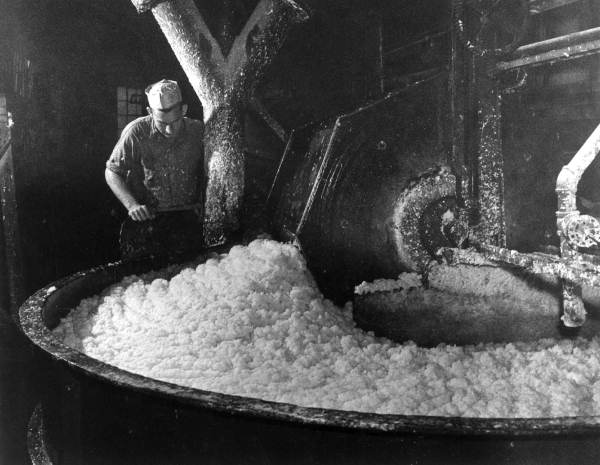 Pulp and paper manufacturing is one of the United States’ largest manufacturing industries, and employed millions of Americans during the 20th century. New York was one of the most active areas for the paper industry, and was home to many of the largest and most prominent paper mills and companies of the time.
Pulp and paper manufacturing is one of the United States’ largest manufacturing industries, and employed millions of Americans during the 20th century. New York was one of the most active areas for the paper industry, and was home to many of the largest and most prominent paper mills and companies of the time.
Unfortunately, workers who were employed by the paper industry are at a high risk of developing mesothelioma due to the industry’s frequent use of asbestos in most pulp and paper plants.
Paper mills had asbestos-containing equipment including pumps, valves, paper machines, boilers, turbines, digesters, and evaporators. Asbestos, a mineral fiber that can crumble to dust during regular use and maintenance, is a deadly carcinogen that is the only known cause of mesothelioma.
Paper mills, which were often poorly ventilated work spaces, would become contaminated with airborne asbestos fibers during the normal day-to-day operations within the plant. When asbestos dust is inhaled or ingested, it causes fibrous masses to form in the lining of the lungs that can eventually become cancerous.
Burrows Paper Corporation
501 W Main St.
Little Falls, NY 13365
Finch, Pruyn & Co.
1 Glen Street
Glens Falls, NY 12801
International Paper
15 Pine st
Corinth, NY 12822
International Paper
568 Shore-Airport Road
Ticonderoga, NY 12883
Pharmaceutical Plants
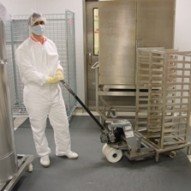 The pharmaceutical industry manufactures drugs for use by consumers. Pharmaceuticals are mass produced in large plants. Prior to the 1990s, these plants used asbestos equipment and materials such as pumps, valves, gaskets, packing, insulation, lab equipment, and ovens.
The pharmaceutical industry manufactures drugs for use by consumers. Pharmaceuticals are mass produced in large plants. Prior to the 1990s, these plants used asbestos equipment and materials such as pumps, valves, gaskets, packing, insulation, lab equipment, and ovens.
Hercules / Ciba Geigy
89 Lower Warren Street and Quaker Road
Glens Falls, NY 12801
Power Plants
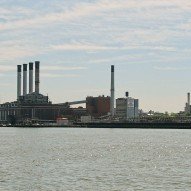 Powerhouses or power plants produce electricity. Energy generation is most commonly achieved through burning fossil fuels such as coal or oil, though alternatives such as hydroelectric dams, nuclear plants, and fields of solar panels or windmills also exist.
Powerhouses or power plants produce electricity. Energy generation is most commonly achieved through burning fossil fuels such as coal or oil, though alternatives such as hydroelectric dams, nuclear plants, and fields of solar panels or windmills also exist.
Nearly 400,000 Americans are currently employed in power generation jobs, and hundreds of thousands more are retired employees of the industry.
Prior to the 1990s, power stations extensively utilized asbestos equipment and materials, including pumps, valves, boilers, tanks, and turbines. This equipment is still in place in some plants. The mineral fiber asbestos, used as gasket material, packing, insulation, and cement, is the only known cause of the highly aggressive cancer mesothelioma.
Asbestos would crumble to dust during routine maintenance and replacement of asbestos-containing parts and equipment. When this dust is inhaled or ingested it forms fibrous tissue in the lungs that can develop into mesothelioma anywhere from 10 to 50 or more years after initial exposure to asbestos.
Shipyards
 The American shipbuilding and ship repair industry has employed hundreds of thousands of workers. In addition to these workers, there are roughly 65,000 longshoremen at American ports, and over 60,000 American sailors manning these vessels.
The American shipbuilding and ship repair industry has employed hundreds of thousands of workers. In addition to these workers, there are roughly 65,000 longshoremen at American ports, and over 60,000 American sailors manning these vessels.
Prior to the 1990s, the mineral fiber asbestos was common in materials and equipment found on ships and at shipyards. Equipment on ships and at shipyards, such as boilers, pipes, pumps, valves, and turbines were heavily insulated with asbestos.
Exposure to asbestos is the only known cause of mesothelioma, a deadly cancer of the lining of the lung. This exposure left workers who built, unloaded, and served on ships during the 20th century at a high risk of developing mesothelioma.
Textile Mills
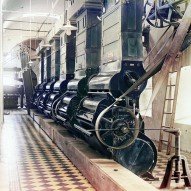 Textile mills are large scale operations where raw fiber is woven into yarn, thread, and fabric. Many different styles and techniques are used to produce these materials, including weaving, knitting, lacing, and braiding, and the finished products are often dyed on site.
Textile mills are large scale operations where raw fiber is woven into yarn, thread, and fabric. Many different styles and techniques are used to produce these materials, including weaving, knitting, lacing, and braiding, and the finished products are often dyed on site.
Over 100,000 American workers are currently employed as textile workers, and many more have since retired from the industry.
Textile workers who were employed at these mills prior to 1990 are at risk of developing mesothelioma – an aggressive cancer of the lining of the lung – due to the use of asbestos equipment and materials at these mills. Asbestos, a fibrous mineral that was used for a number of industrial applications throughout the 20th century, is the sole known cause of mesothelioma.
When asbestos materials and equipment would create dust, due to agitation during regular use and routine maintenance and repair, this dust would contaminate the air of the mill. When the contaminated air was inhaled or ingested by workers, millions of microscopic asbestos fibers would enter their lungs, which formed fibrous masses in the tissue lining the lung.
Over a period of ten to fifty years, these fibrous masses could become malignant, resulting in mesothelioma.
If you think you are one of the victims, seek help from our dedicated mesothelioma lawyers at Belluck Law, LLP. We also have locations at Albany, Rochester, NYC and Woodstock.



